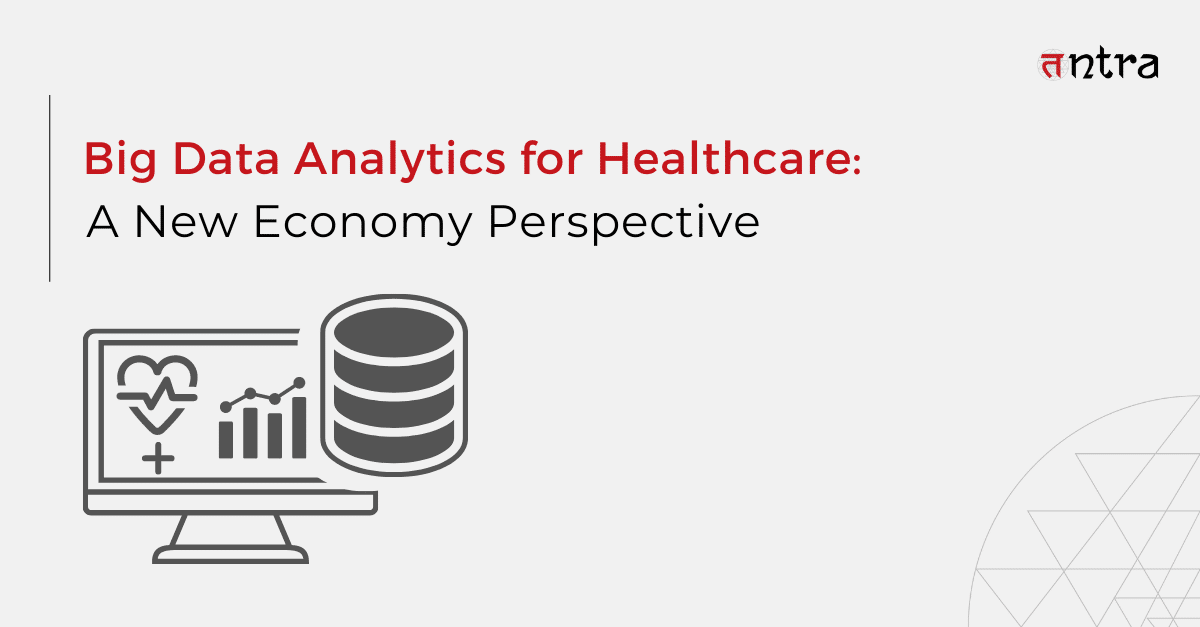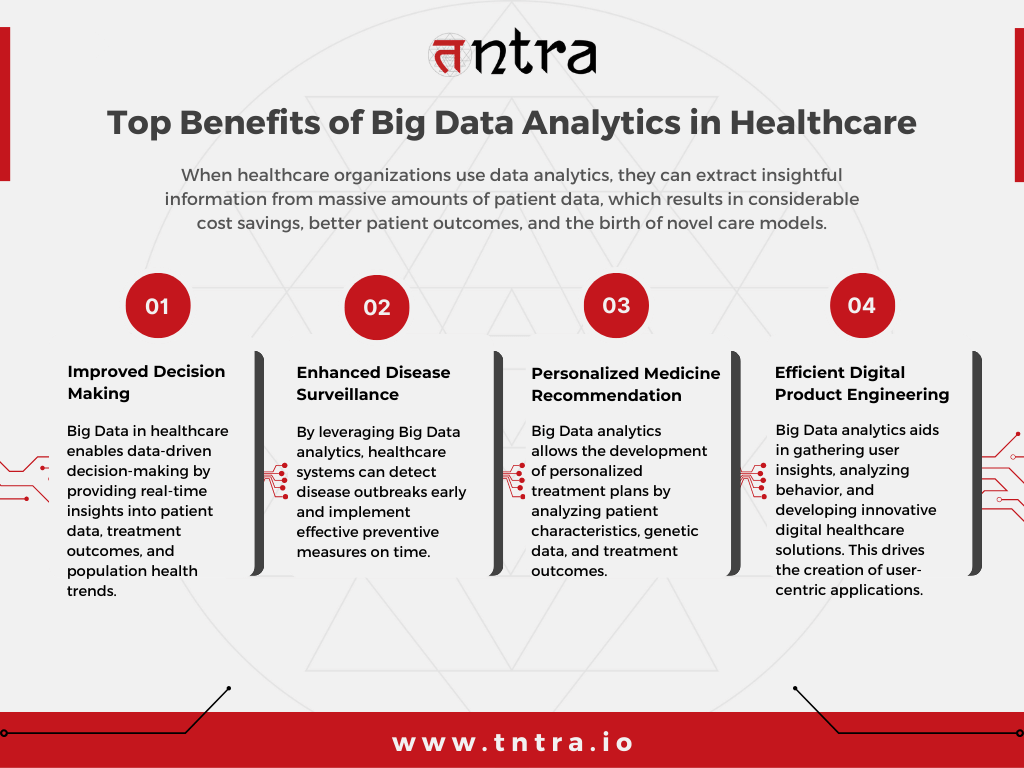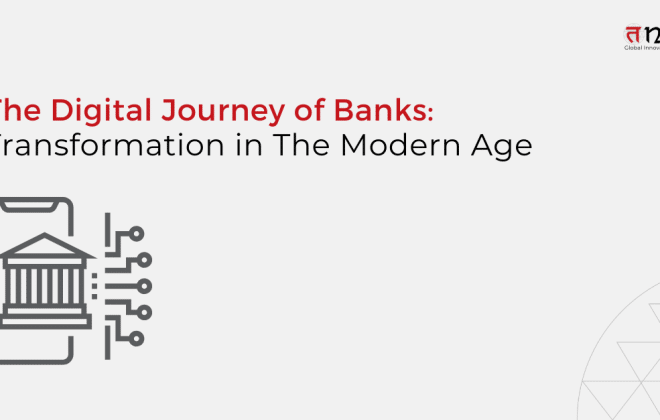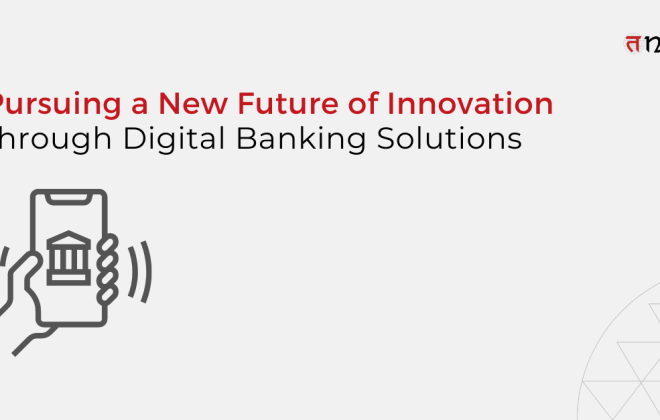
Big Data Analytics for Healthcare: A New Economy Perspective
Table of Contents
ToggleSummary
Using Big Data analytics for healthcare is revolutionizing the industry and driving innovation. It has significantly improved efficiency, productivity, and decision-making effectiveness. Big Data analytics enables healthcare organizations to extract valuable insights from vast amounts of patient data, leading to cost savings, better patient outcomes, and the development of novel care models. Key benefits of Big Data in healthcare include improved decision-making, enhanced disease surveillance and prevention, personalized medicine, and efficient digital product engineering. Through applications such as predictive analytics, population health management, personalized medicine, and clinical trial optimization, Big Data analytics transforms healthcare and prioritizes value, convenience, and patient-centricity.
Siemens Healthiness: Revolutionizing Healthcare with Big Data Analytics and Predictive Maintenance
Siemens Healthineers, a global medical equipment manufacturing company, is leveraging Big Data analytics to enhance healthcare services and outcomes. Using Teradata’s data analytics software platform, Teradata Vantage, Siemens Healthineers aggregates and analyzes diverse datasets from machines, service, sales, and customer-related data to view their operations comprehensively.
Siemens Healthineers utilizes Big Data analytics for healthcare to enhance its service delivery process. By analyzing machine and process data, service parts, and labor efforts, they proactively predict system failures up to 21 days in advance. This enables them to reduce onsite troubleshooting, minimize productivity losses due to equipment downtime, and ensure uninterrupted patient care. As a result, Siemens Healthineers achieves higher operational efficiency and increased customer satisfaction while maintaining continuous equipment uptime for healthcare providers.
Additionally, by leveraging Big Data analytics solutions in healthcare, Siemens Healthineers optimizes its service delivery process. They use data-driven insights to reduce the need for onsite troubleshooting and minimize productivity losses associated with equipment downtime. Through dashboards and artificial intelligence, they gain transparency into their global installed base and service operations, enabling the automation of data-driven services and enhancing overall efficiency.
Combining Big Data analytics and predictive maintenance has improved asset utilization, operational efficiency, and customer confidence. Siemens Healthineers can anticipate and address potential issues before they impact system performance, ensuring high equipment uptime and uninterrupted patient healthcare services. The ability to connect people, machines, and data in a heavily regulated industry while maintaining compliance with data privacy laws further demonstrates the value of Big Data analytics in transforming healthcare services.
Source: Forbes
Growing Use of Big Data Analytics in Healthcare Innovation
Analytics have significantly altered an organization’s environment by giving enterprises useful insights that produce beneficial outcomes. More businesses are using data analytics and Big Data analytics software services, mostly because of this. As evidence, Data analytics has helped improve the efficiency and productivity by 63%. There is also a 57% improvement in decision-making speed and effectiveness.
The use of Big Data analytics in healthcare is on the rise, and the Covid-19 pandemic has made its importance particularly clear. In particular, data analytics has been crucial in battling the issue. For instance, deep learning techniques allowed for an astonishing 95% accuracy in identifying Covid-19 using CT images. Epidemiologists were able to spot a string of pneumonia cases in Wuhan, China, thanks largely to the use of AI technology, which was also helpful in tracking the outbreak’s early warning symptoms. These instances demonstrate the enormous potential for healthcare companies and institutions to work with software product engineering solutions companies and develop Big Data analytics solutions to transform healthcare and thus address pressing issues.
At present, as per a report, the global data volume created by the healthcare sector is about 30%. The compound annual growth rate of healthcare data will be 36% by 2025. This is 6% quicker than the industrial sector, 10% quicker than the financial sector, and 11% quicker than the media & entertainment sector. Additionally, as per estimates, the worldwide healthcare analytics market will generate $21.1 billion in revenue in 2021, $27.4 billion in 2022, and $85.9 billion by 2027, expanding at a CAGR of 25.7% from 2022 to 2027.
Big Data Analytics for Healthcare: Benefits and Application
A fundamental shift in healthcare is being driven by the integration of the new economy, and data analytics are playing a key part in this change. Healthcare is becoming more accessible, individualized, and effective by incorporating cutting-edge technology like telemedicine, artificial intelligence (AI), and Big Data analytics.
When healthcare organizations use data analytics, they can extract insightful information from massive amounts of patient data, which results in considerable cost savings, better patient outcomes, and the birth of novel care models. Big Data in healthcare is a significant driver of advancement within the New Economy paradigm, ushering in a new era of healthcare that stresses value, convenience, and patient-centricity.
Let us look at the importance of Big Data in healthcare and its different applications.
Top Benefits of Big Data in Healthcare
- Improved Decision Making
- Big Data in healthcare enables data-driven decision-making by providing real-time insights into patient data, treatment outcomes, and population health trends. This enhances patient care and optimizes resource allocation.
- Enhanced Disease Surveillance and Prevention
- Leveraging Big Data analytics, healthcare systems can detect disease outbreaks early and implement preventive measures. Analyzing diverse data sources, including electronic health records and social media, helps proactively respond to public health emergencies.
- Personalized Medicine
- Big Data analytics allows the development of personalized treatment plans by analyzing patient characteristics, genetic data, and treatment outcomes. Tailoring interventions to individual needs improves treatment effectiveness and reduces adverse events.
- Efficient Digital Product Engineering
- Big Data analytics aids in gathering user insights, analyzing behavior, and developing innovative digital healthcare solutions. This drives the creation of user-centric applications, telemedicine platforms, and remote patient monitoring systems, advancing digital transformation in healthcare.
- Adopting Big Data in healthcare brings improved decision-making, disease surveillance, personalized medicine, and efficient digital product engineering. Partner with Tntra to unlock the benefits of the New economy.

Application of Big Data in Healthcare
The use of Big Data analytics in healthcare has produced several noteworthy applications that are revolutionizing the sector. Let us look at the impact of Big Data analytics on healthcare management.
- Predictive Analytics for Patient Outcomes
- Big Data analytics makes it possible to examine enormous volumes of patient data to find patterns and trends that can be used to detect which patients are more likely to experience complications or need to be readmitted. This knowledge supports the creation of focused therapies to enhance patient outcomes.
- Population Health Management
- Using Big Data analytics, healthcare professionals can examine data from sizable populations to spot patterns and trends in the prevalence of diseases and their risk factors. By forecasting and monitoring population health with the help of this information, proactive actions can be made, improving overall health outcomes.
- Personalized Medicine
- Big Data analytics allows it to analyze patient information individually, including genetic data and treatment outcomes, to determine a patient’s best action. This tailored approach to medicine enhances the effectiveness of treatments and patient outcomes.
- Clinical Trial Optimization
- Big Data analytics helps pharmaceutical companies optimize clinical trials by examining patient data and past studies. More effective and fruitful trials entail identifying patients most likely to respond to particular treatments, optimizing trial design, and improving patient selection.
- Big Data analytics is revolutionizing healthcare with applications such as predictive analytics, population health management, personalized medicine, and more. Partner with a software product engineering company like Tntra to unlock the full potential of these transformative solutions.
Tntra’s EVV platform aids in verifying home healthcare visits, ensuring that patients receive proper care and minimizing the occurrence of fraudulent visits. Explore the caregiver app case study to gain further insights.
Conclusion
The impact of Big Data on healthcare is transformative. Utilizing the power of data analytics, healthcare companies can deliver tailored medication, improve disease surveillance and prevention, and maximize clinical trials. These developments redefine patient care, enhance outcomes, and propel the healthcare sector’s digital transformation. Big Data analytics provide enormous potential for enhancing healthcare delivery and addressing urgent problems as healthcare data increases. Healthcare’s future hinges on efficiently leveraging the amount of data that Big Data analytics provides.
Ready to harness the potential of Data Analytics in Healthcare? Take the Next Step with Tntra’s New Economy solutions. Schedule a Demo to explore how our cutting-edge data analytics platform can empower your organization to make data-driven decisions, enhance patient care, and stay ahead in the rapidly evolving healthcare landscape.
Contact Tntra today for Data Analytics Services and Solutions.





